A massive explosion rocked Beirut on Tuesday, flattening much of the city's port, damaging buildings across the capital and sending a giant mushroom
A massive explosion rocked Beirut on Tuesday, flattening much of the city’s port, damaging buildings across the capital and sending a giant mushroom cloud into the sky. At least 100 people were killed and more than 4,000 injured, with bodies buried in the rubble, officials said.
The blast struck with the force of a 3.5 magnitude earthquake, according to Germany’s geosciences center GFZ, and it was heard and felt as far away as Cyprus more than 200 kilometers (180 miles) across the Mediterranean.
The sudden devastation overwhelmed a country already struggling with both the coronavirus pandemic and an economic crisis. For hours afterward, ambulances rushing in from around Lebanon carried away the wounded. Hospitals quickly filled beyond capacity, pleading for blood supplies, and generators to keep their lights on.
For blocks around the port, where the explosion took place, bloodied residents staggered through streets lined with overturned cars and littered with rubble from shattered buildings. Windows and doors were blown out kilometers (miles) away. Army helicopters helped battle fires raging at Beirut’s port.
The cause of the blast was not immediately known, but initial reports suggested a fire had detonated a warehouse at the port.
Abbas Ibrahim, chief of Lebanese General Security, said it might have been caused by highly explosive material that was confiscated from a ship some time ago and stored at the port. Local television channel LBC said the material was sodium nitrate. Witnesses reported seeing a strange orange-colored cloud like that which appears when toxic nitrogen dioxide gas is released after an explosion involving nitrates.
Abbas Ibrahim, chief of Lebanese General Security, said it might have been caused by highly explosive material that was confiscated from a ship some time ago and stored at the port. Local television channel LBC said the material was sodium nitrate. Witnesses reported seeing a strange orange-colored cloud like that which appears when toxic nitrogen dioxide gas is released after an explosion involving nitrates.
#انفجار_بيروت
— Wissam Hajjar وسام الحجار (@whajjar) August 4, 2020
انفجار وكأنه نووي pic.twitter.com/hH2qdtGZ8w
The explosion came amid ongoing tensions between Israel and the Hezbollah military group on Lebanon’s southern border. Many residents reported hearing planes overhead just before the blast, fueling rumors of an attack, though Israeli military overflights are common. An Israeli government official said Israel “had nothing to do” with the blast. He spoke on condition of anonymity because he was not authorized to discuss the matter with the news media. Israeli officials usually do not comment on “foreign reports.”
U.S. Secretary of State Mike Pompeo extended his “deepest condolences” to the people of Beirut and said the United States is closely monitoring the situation. “Our team in Beirut has reported to me the extensive damage to a city and a people that I hold dear, an additional challenge in a time of already deep crisis,” Pompeo said in a written statement.
The blast was stunning even for a city that has seen civil war, suicide bombings and bombardment by Israel.
“It was a real horror show. I haven’t seen anything like that since the days of the (civil) war,” said Marwan Ramadan, who was about 500 meters (yards) from the port and was knocked off his feet by the force of the explosion.
Health Minister Hassan Hamad said the preliminary toll was more than 70 dead and more than 3,000 wounded. Emergency teams streamed in from across Lebanon to help, and the injured had to be taken to hospitals outside the capital. Hamad added that hospitals were barely coping and offers of aid were pouring in from Arab states and friends of Lebanon. An official with the Lebanese Red Cross later said at least 100 people were killed and more than 4,000 were wounded. The official, George Kettaneh, said the toll could rise further.
Beirut’s governor, Marwan Abboud, broke into tears as he toured the site, exclaiming, “Beirut is a devastated city.” Prime Minister Hassan Diab vowed that “those responsible will pay.”
Initially, video taken by residents showed a fire raging at the port, sending up a giant column of smoke, illuminated by flashes of what appeared to be fireworks. Local TV stations reported that a fireworks warehouse was involved. The fire then appeared to spread to a nearby building, triggering a more massive explosion, sending up a mushroom cloud and generating a shock wave.
One of Israel’s top bomb experts, Boaz Hayoun, said fireworks could have been a factor setting off the bigger blast. “Before the big explosion, … in the center of the fire, you can see sparks, you can hear sounds like popcorn and you can hear whistles,” said Hayoun, owner of the Tamar Group, which works closely with the Israeli government on safety and certification issues involving explosives. “This is very specific behavior of fireworks.”
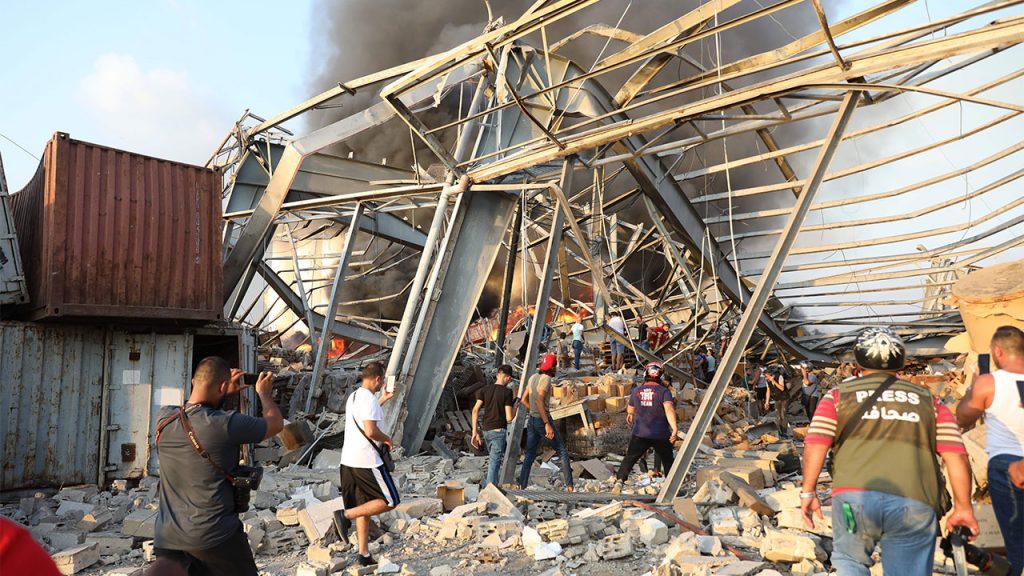
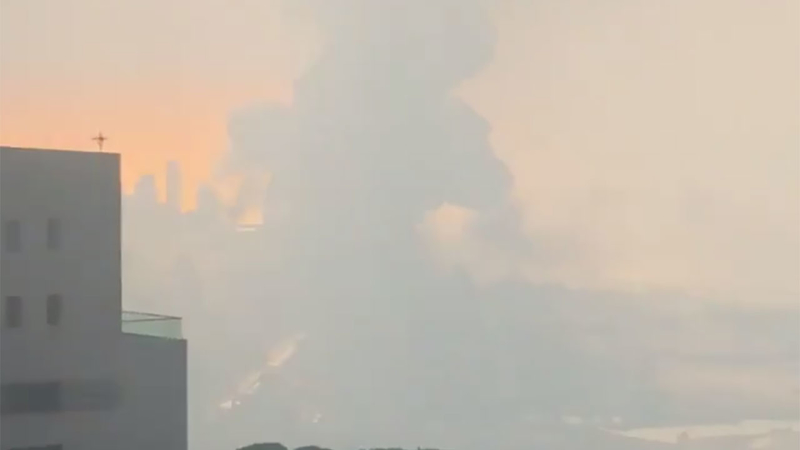
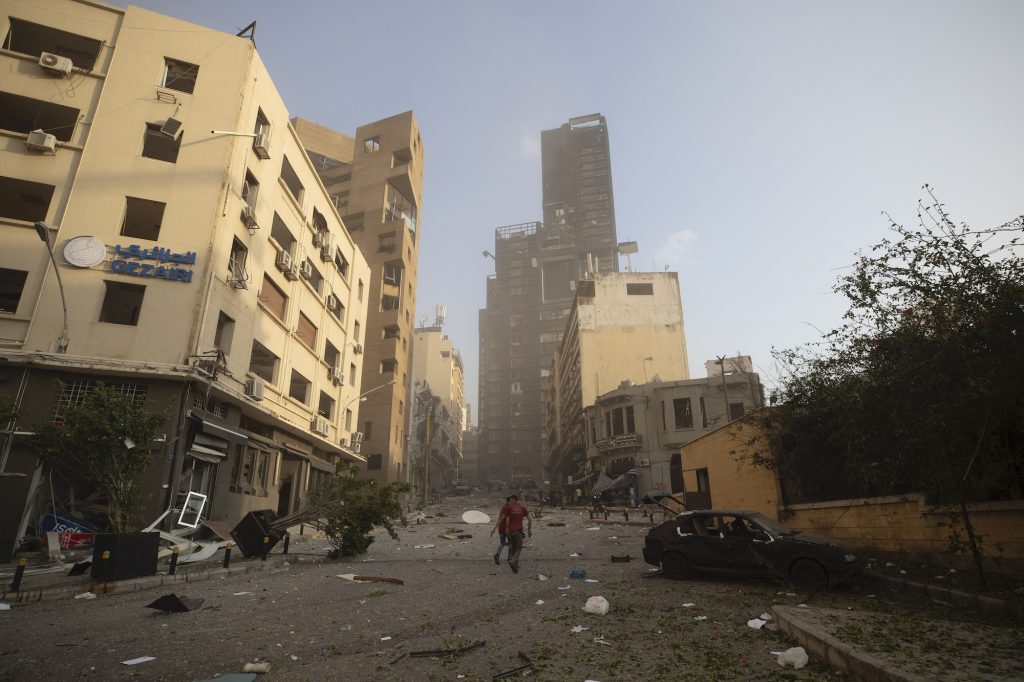
Aftermath of a massive explosion is seen in in Beirut, Lebanon, Tuesday, Aug. 4, 2020. Massive explosions rocked downtown Beirut on Tuesday, flattening much of the port, damaging buildings and blowing out windows and doors as a giant mushroom cloud rose above the capital. Witnesses saw many people injured by flying glass and debris. (AP Photo/Hassan Ammar) 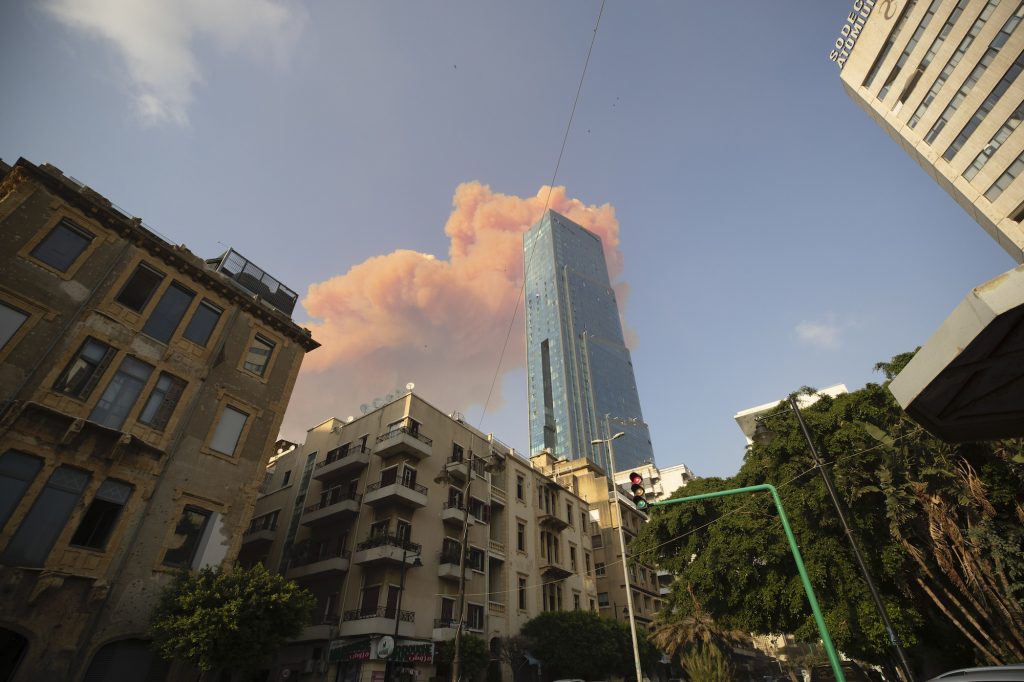
A cloud from a massive explosion is seen in in Beirut, Lebanon, Tuesday, Aug. 4, 2020. Massive explosions rocked downtown Beirut on Tuesday, flattening much of the port, damaging buildings and blowing out windows and doors as a giant mushroom cloud rose above the capital. Witnesses saw many people injured by flying glass and debris. (AP Photo/Hassan Ammar) 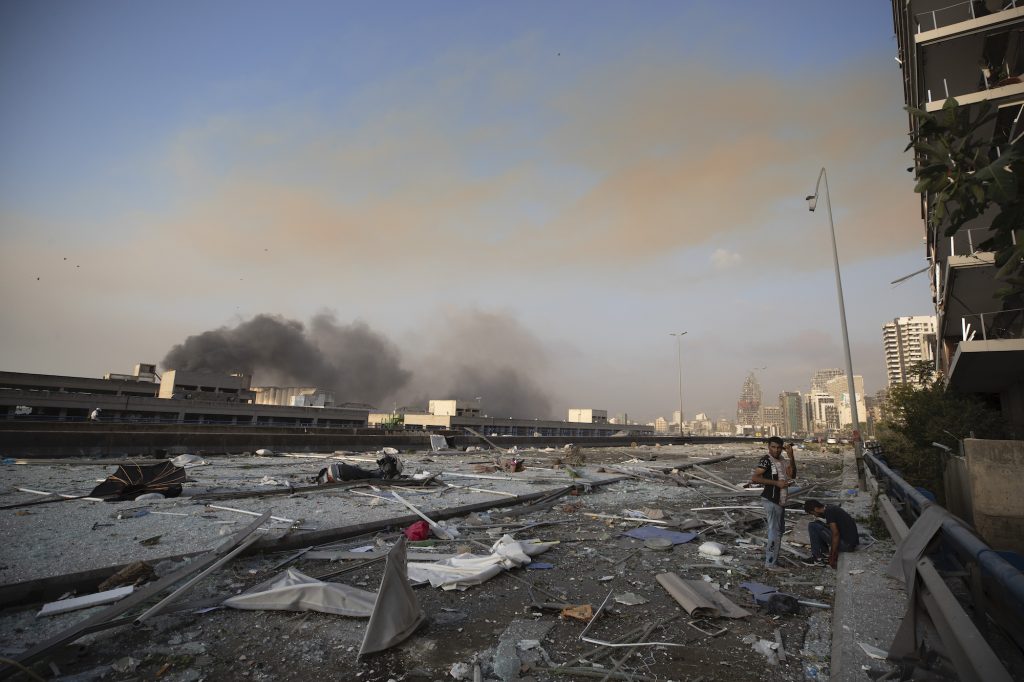
Aftermath of a massive explosion is seen in in Beirut, Lebanon, Tuesday, Aug. 4, 2020. Massive explosions rocked downtown Beirut on Tuesday, flattening much of the port, damaging buildings and blowing out windows and doors as a giant mushroom cloud rose above the capital. Witnesses saw many people injured by flying glass and debris. (AP Photo/Hassan Ammar) 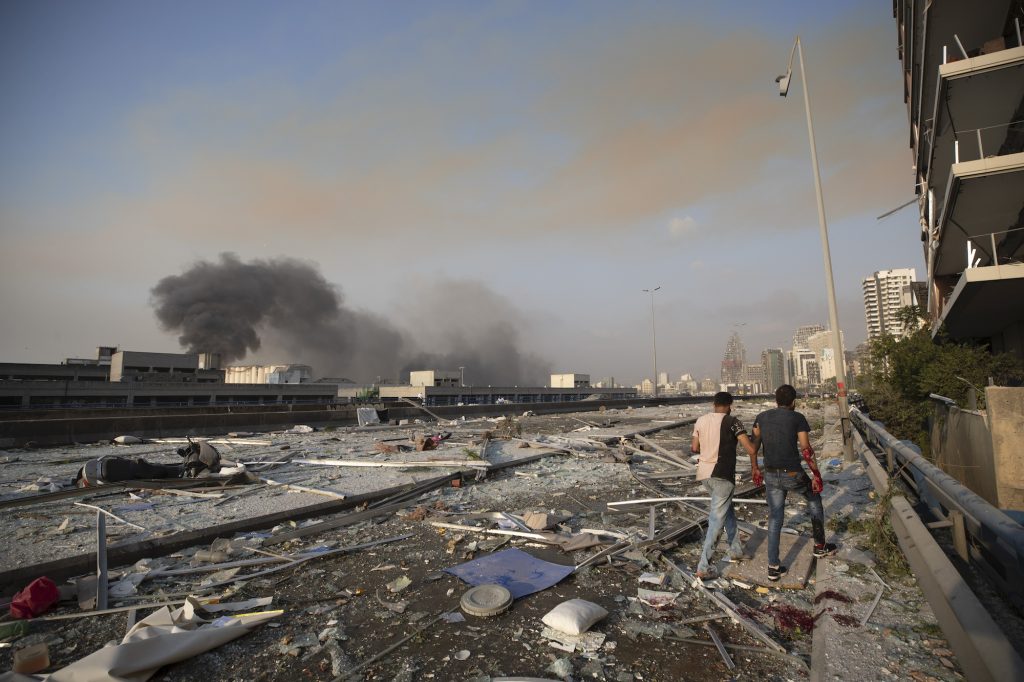
Aftermath of a massive explosion is seen in in Beirut, Lebanon, Tuesday, Aug. 4, 2020. Massive explosions rocked downtown Beirut on Tuesday, flattening much of the port, damaging buildings and blowing out windows and doors as a giant mushroom cloud rose above the capital. Witnesses saw many people injured by flying glass and debris. (AP Photo/Hassan Ammar) 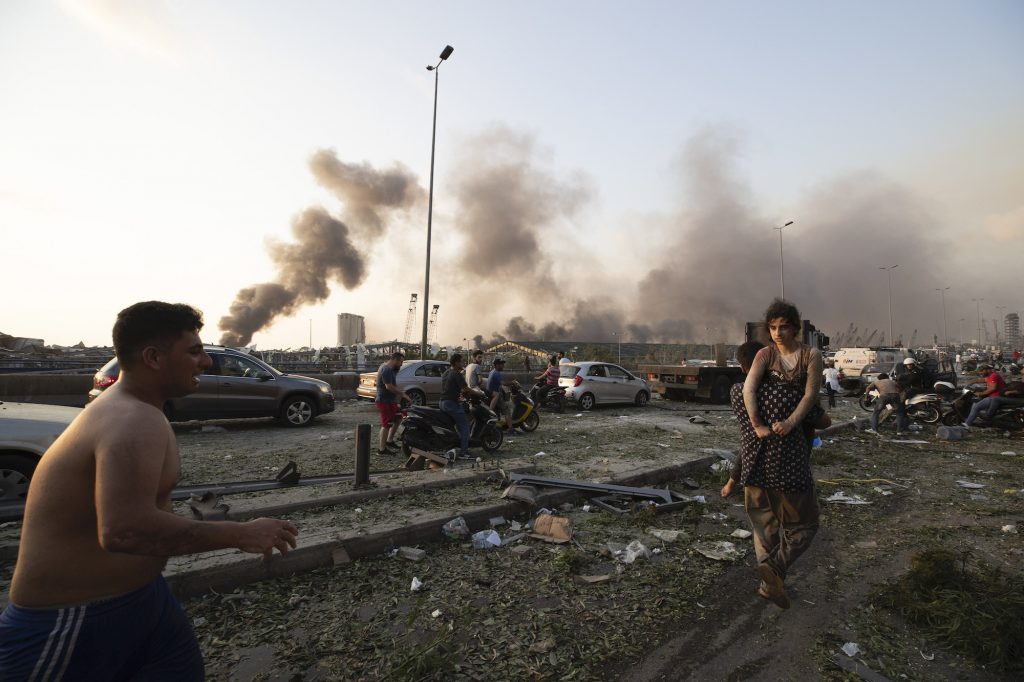
People evacuate wounded after of a massive explosion in Beirut, Lebanon, Tuesday, Aug. 4, 2020. Massive explosions rocked downtown Beirut on Tuesday, flattening much of the port, damaging buildings and blowing out windows and doors as a giant mushroom cloud rose above the capital. Witnesses saw many people injured by flying glass and debris. (AP Photo/Hassan Ammar) 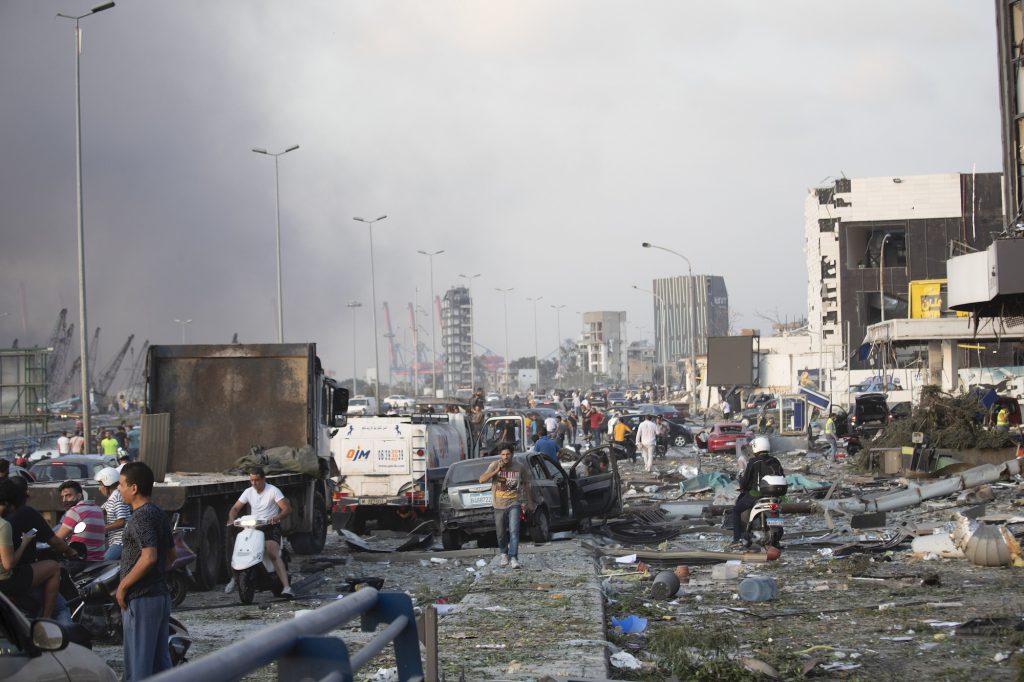
People evacuate wounded after of a massive explosion in Beirut, Lebanon, Tuesday, Aug. 4, 2020. Massive explosions rocked downtown Beirut on Tuesday, flattening much of the port, damaging buildings and blowing out windows and doors as a giant mushroom cloud rose above the capital. Witnesses saw many people injured by flying glass and debris. (AP Photo/Hassan Ammar) 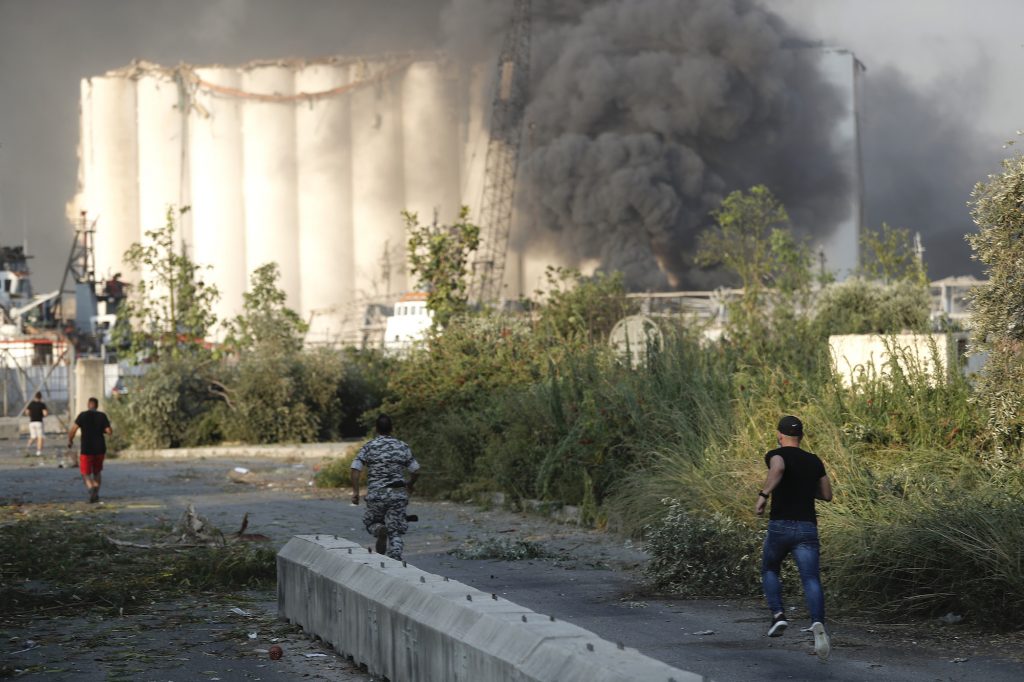
Lebanese security officers run to the explosion scene that hit the seaport, in Beirut Lebanon, Tuesday, Aug. 4, 2020. Massive explosions rocked downtown Beirut on Tuesday, flattening much of the port, damaging buildings and blowing out windows and doors as a giant mushroom cloud rose above the capital. Witnesses saw many people injured by flying glass and debris. (AP Photo/Hussein Malla) 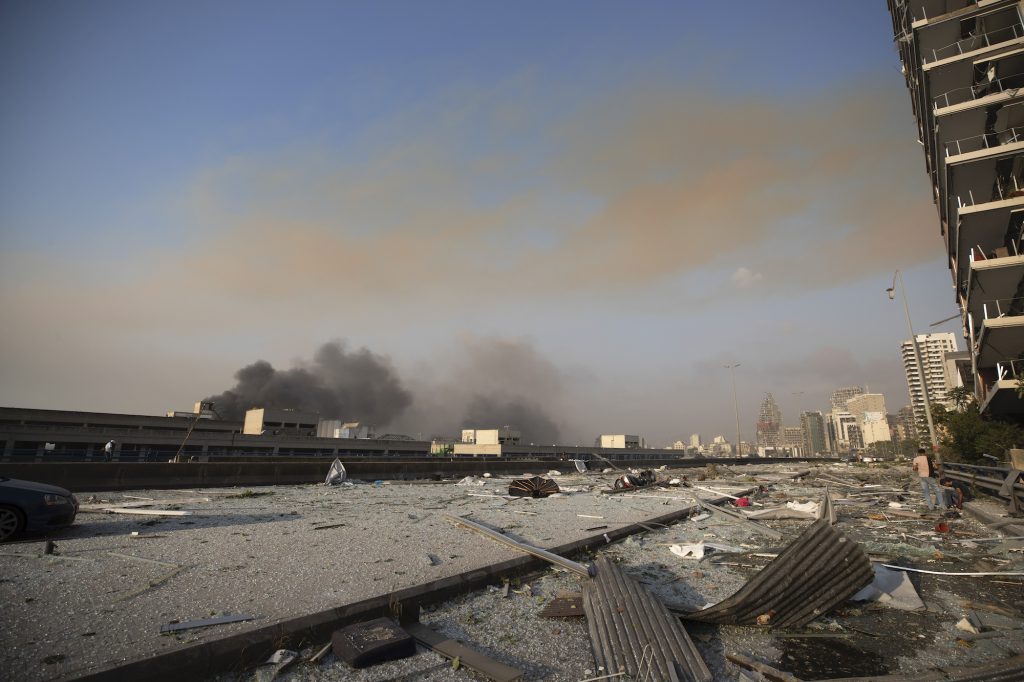
Aftermath of a massive explosion is seen in in Beirut, Lebanon, Tuesday, Aug. 4, 2020. Massive explosions rocked downtown Beirut on Tuesday, flattening much of the port, damaging buildings and blowing out windows and doors as a giant mushroom cloud rose above the capital. Witnesses saw many people injured by flying glass and debris. (AP Photo/Hassan Ammar) 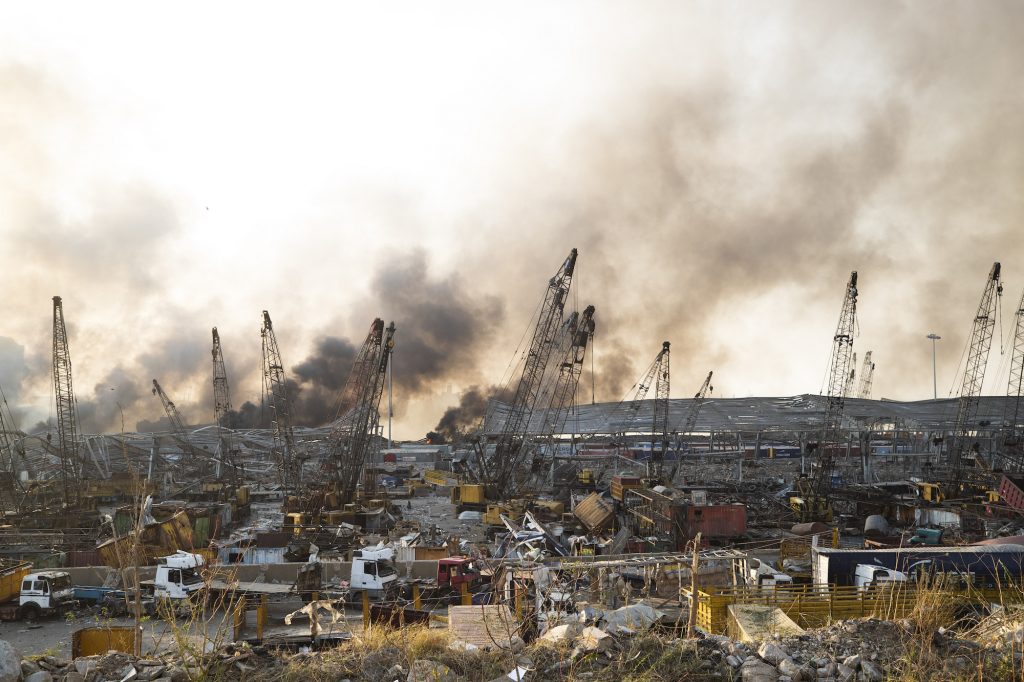
Aftermath of a massive explosion is seen in in Beirut, Lebanon, Tuesday, Aug. 4, 2020. Massive explosions rocked downtown Beirut on Tuesday, flattening much of the port, damaging buildings and blowing out windows and doors as a giant mushroom cloud rose above the capital. Witnesses saw many people injured by flying glass and debris. (AP Photo/Hassan Ammar) 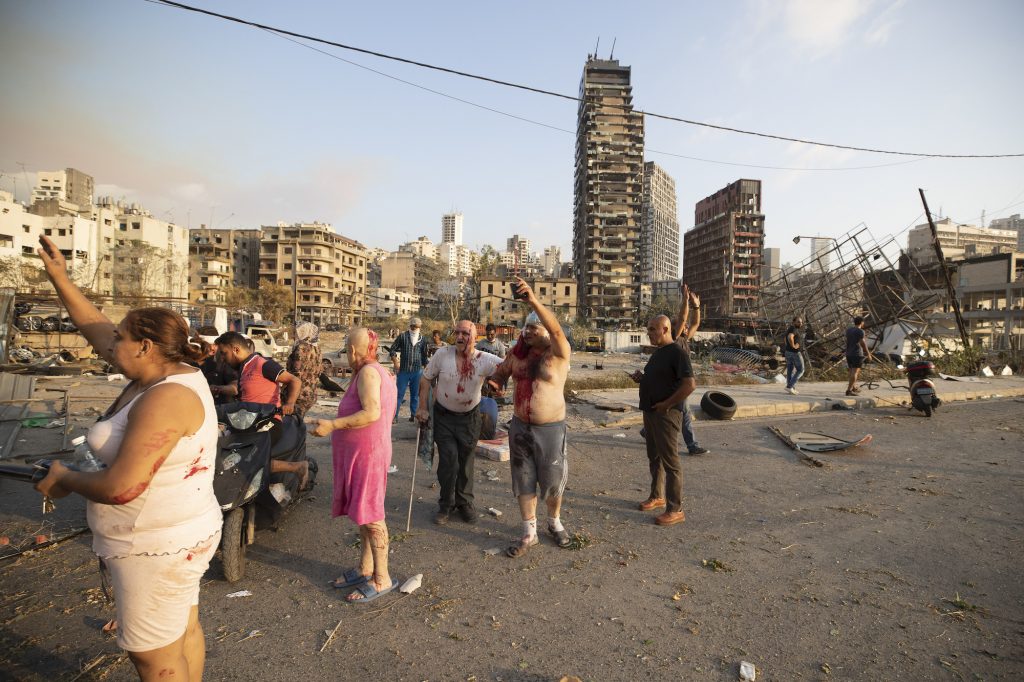
Injured people stand after a massive explosion in Beirut, Lebanon, Tuesday, Aug. 4, 2020. Massive explosions rocked downtown Beirut on Tuesday, flattening much of the port, damaging buildings and blowing out windows and doors as a giant mushroom cloud rose above the capital. Witnesses saw many people injured by flying glass and debris. (AP Photo/Hassan Ammar) 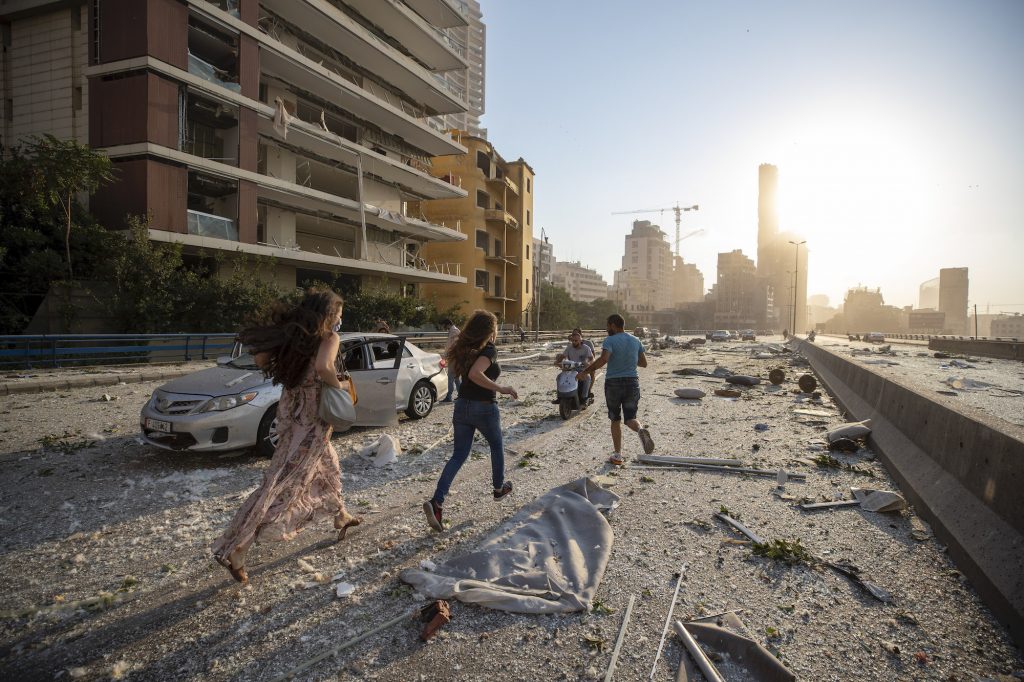
Aftermath of a massive explosion is seen in in Beirut, Lebanon, Tuesday, Aug. 4, 2020. Massive explosions rocked downtown Beirut on Tuesday, flattening much of the port, damaging buildings and blowing out windows and doors as a giant mushroom cloud rose above the capital. Witnesses saw many people injured by flying glass and debris. (AP Photo/Hassan Ammar) 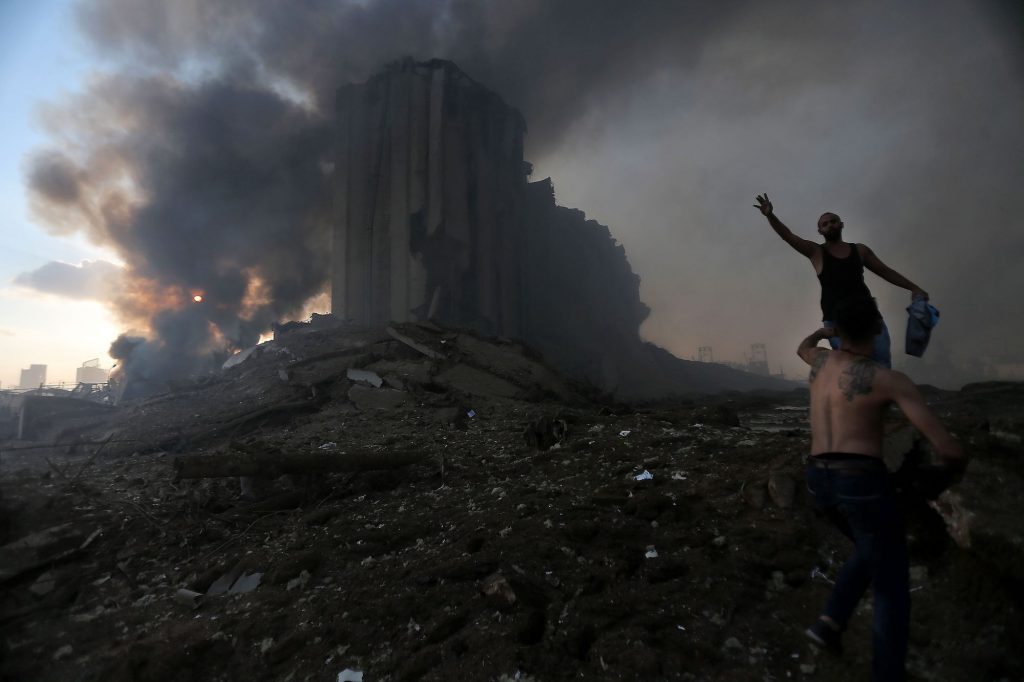
EDITORS NOTE: Graphic content / A picture shows the scene of an explosion in Beirut on August 4, 2020. – Two huge explosion rocked the Lebanese capital Beirut, wounding dozens of people, shaking buildings and sending huge plumes of smoke billowing into the sky. Lebanese media carried images of people trapped under rubble, some bloodied, after the massive explosions, the cause of which was not immediately known. (Photo by STR / AFP) (Photo by STR/AFP via Getty Images) 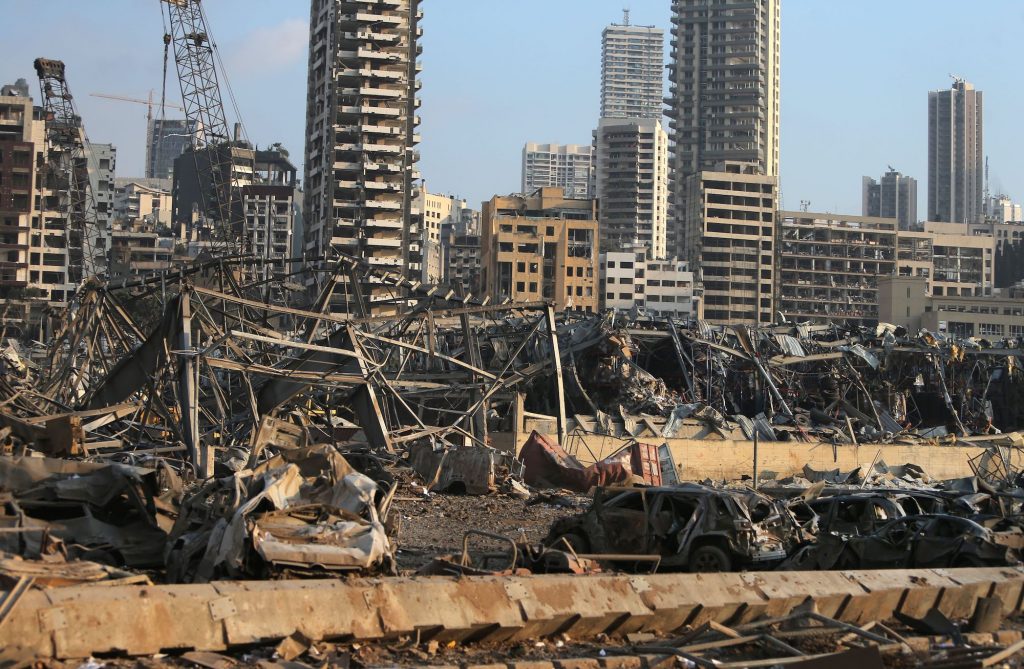
EDITORS NOTE: Graphic content / A picture shows the scene of an explosion at the port in Beirut on August 4, 2020. – Two huge explosion rocked the Lebanese capital Beirut, wounding dozens of people, shaking buildings and sending huge plumes of smoke billowing into the sky. Lebanese media carried images of people trapped under rubble, some bloodied, after the massive explosions, the cause of which was not immediately known. (Photo by STR / AFP) (Photo by STR/AFP via Getty Images) 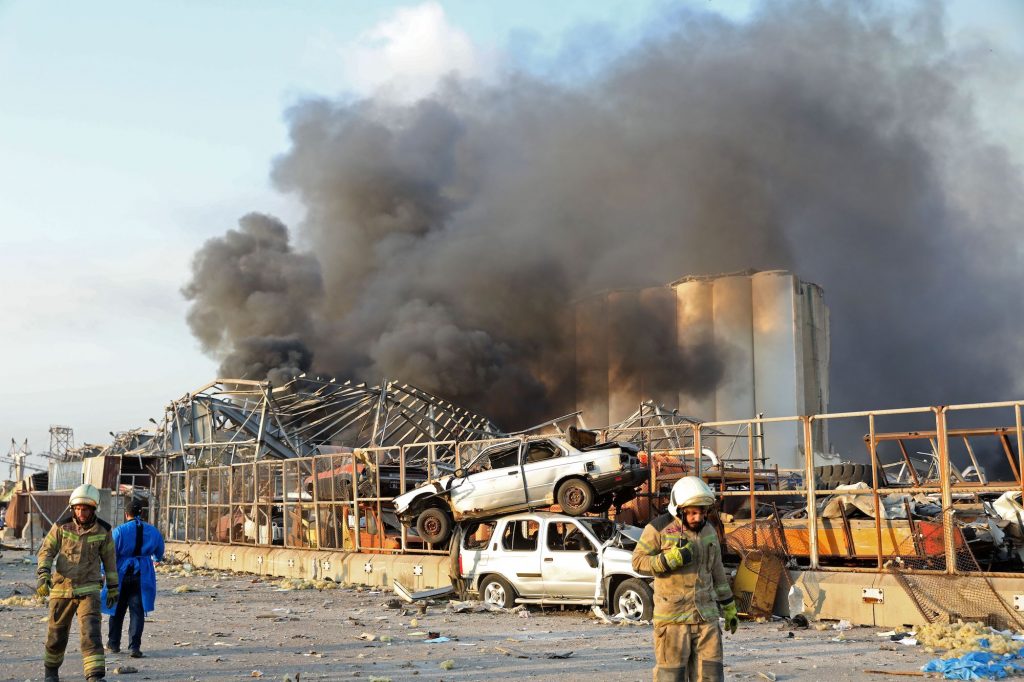
EDITORS NOTE: Graphic content / A picture shows the scene of an explosion at the port in Beirut on August 4, 2020. – Two huge explosion rocked the Lebanese capital Beirut, wounding dozens of people, shaking buildings and sending huge plumes of smoke billowing into the sky. Lebanese media carried images of people trapped under rubble, some bloodied, after the massive explosions, the cause of which was not immediately known. (Photo by ANWAR AMRO / AFP) (Photo by ANWAR AMRO/AFP via Getty Images) 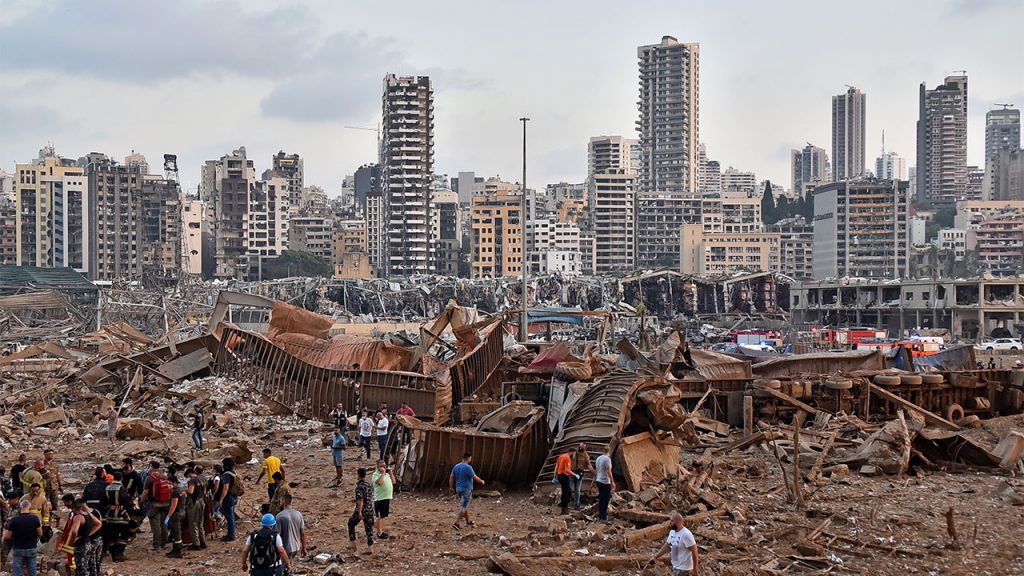
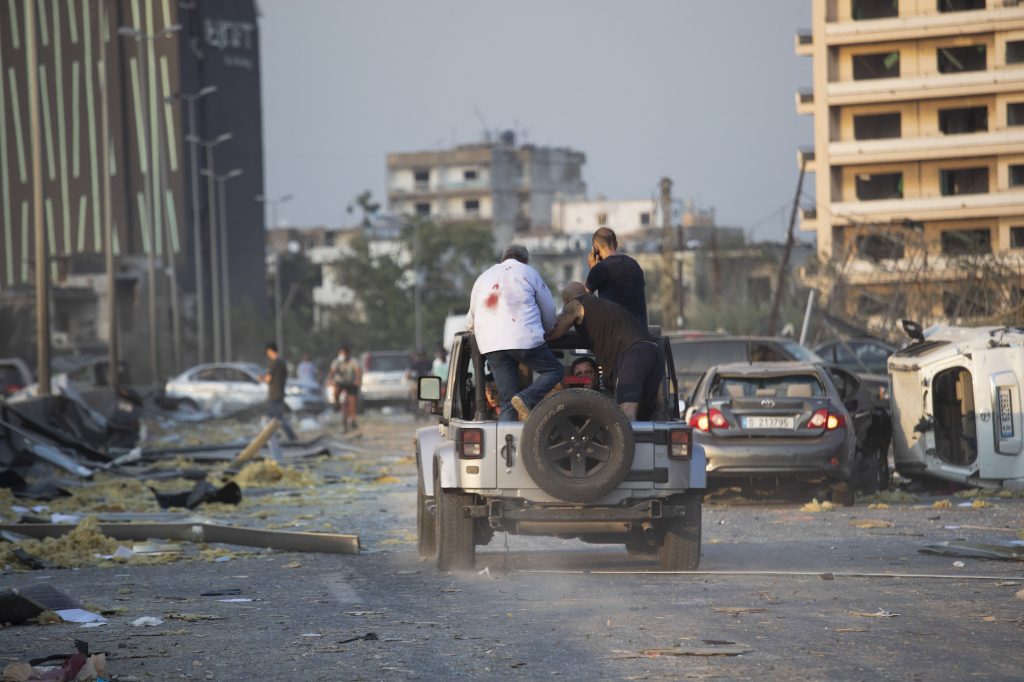
People evacuate wounded after of a massive explosion in Beirut, Lebanon, Tuesday, Aug. 4, 2020. Massive explosions rocked downtown Beirut on Tuesday, flattening much of the port, damaging buildings and blowing out windows and doors as a giant mushroom cloud rose above the capital. Witnesses saw many people injured by flying glass and debris. (AP Photo/Hassan Ammar) 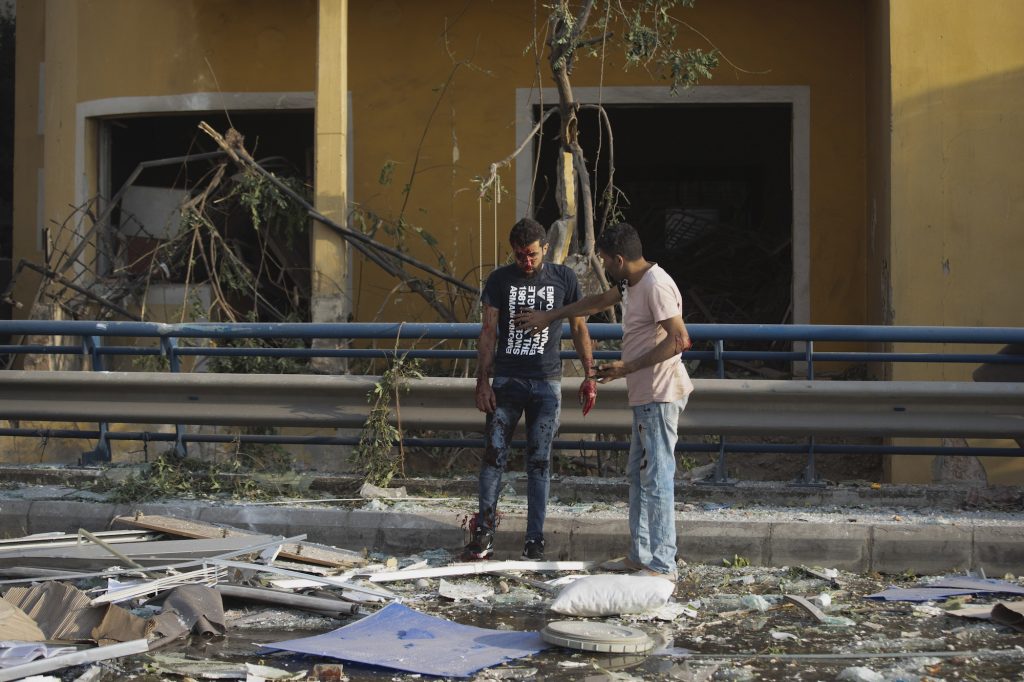
Injured people stand after a massive explosion in Beirut, Lebanon, Tuesday, Aug. 4, 2020. Massive explosions rocked downtown Beirut on Tuesday, flattening much of the port, damaging buildings and blowing out windows and doors as a giant mushroom cloud rose above the capital. Witnesses saw many people injured by flying glass and debris. (AP Photo/Hassan Ammar) 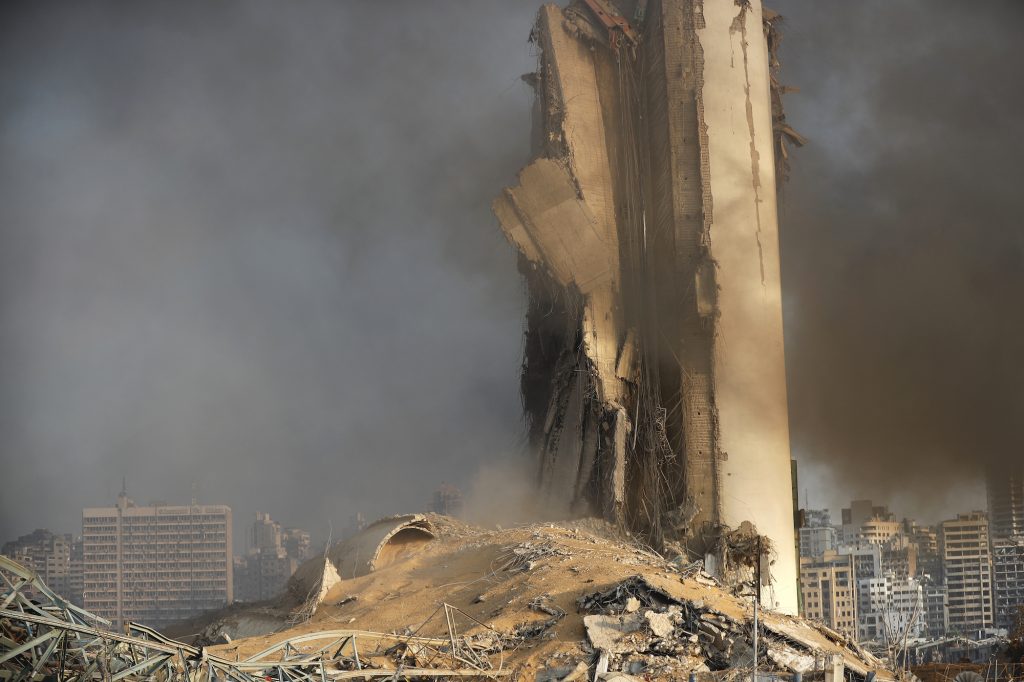
A picture show the destroy silo, at the explosion scene that hit the seaport of Beirut, Lebanon, Tuesday, Aug. 4, 2020. Massive explosions rocked downtown Beirut on Tuesday, flattening much of the port, damaging buildings and blowing out windows and doors as a giant mushroom cloud rose above the capital. Witnesses saw many people injured by flying glass and debris. (AP Photo/Hussein Malla) 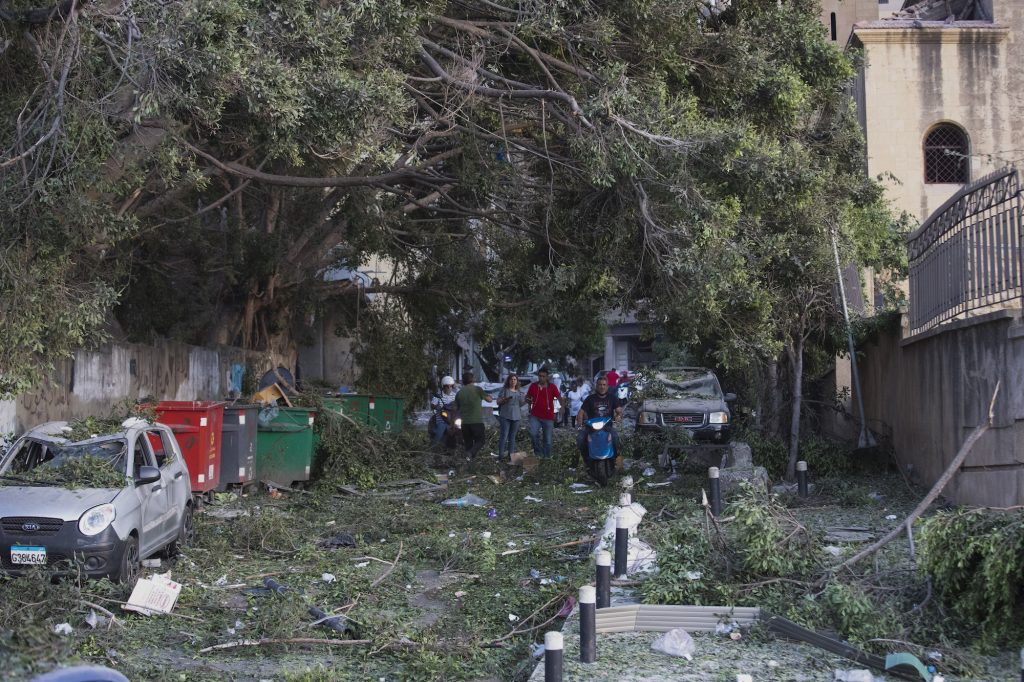
Aftermath of a massive explosion is seen in in Beirut, Lebanon, Tuesday, Aug. 4, 2020. Massive explosions rocked downtown Beirut on Tuesday, flattening much of the port, damaging buildings and blowing out windows and doors as a giant mushroom cloud rose above the capital. Witnesses saw many people injured by flying glass and debris. (AP Photo/Hassan Ammar) 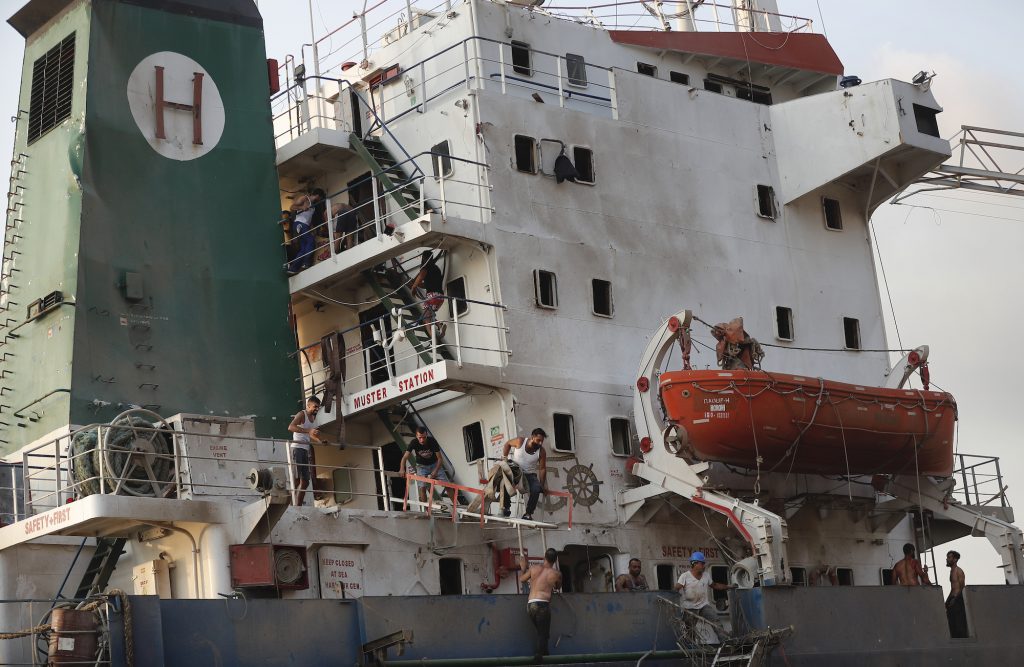
Sailors evacuate their damaged ship which dock near the explosion scene that hit the seaport of Beirut, Lebanon, Tuesday, Aug. 4, 2020. Massive explosions rocked downtown Beirut on Tuesday, flattening much of the port, damaging buildings and blowing out windows and doors as a giant mushroom cloud rose above the capital. (AP Photo/Hussein Malla) 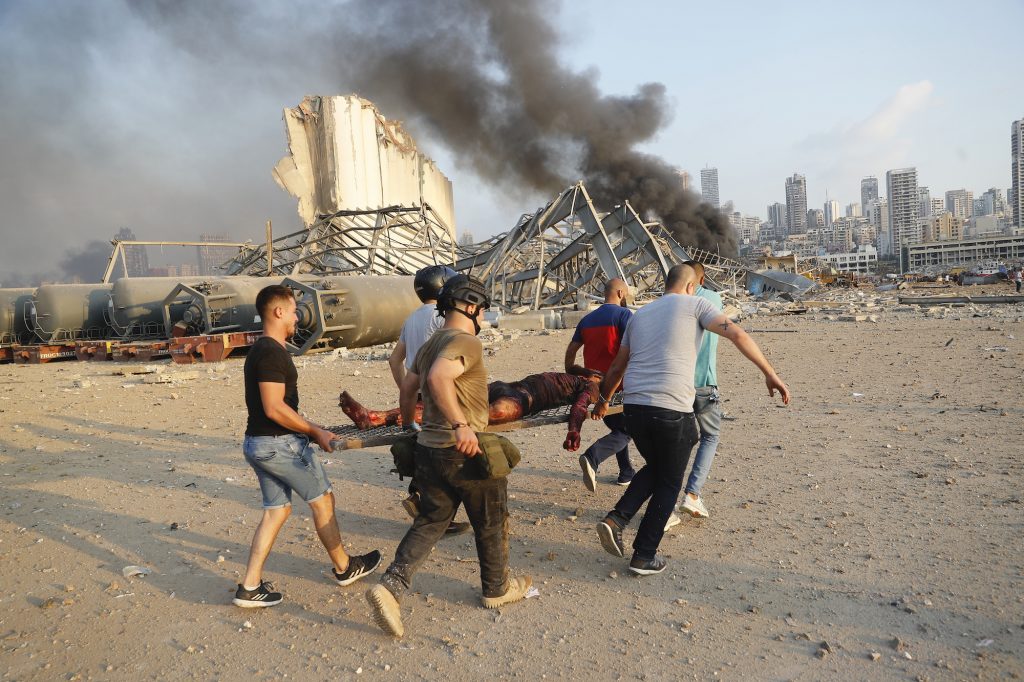
Civilians carry a victim at the explosion scene that hit the seaport, in Beirut Lebanon, Tuesday, Aug. 4, 2020. Massive explosions rocked downtown Beirut on Tuesday, flattening much of the port, damaging buildings and blowing out windows and doors as a giant mushroom cloud rose above the capital. Witnesses saw many people injured by flying glass and debris. (AP Photo/Hussein Malla)
Article Source: abc7news.com